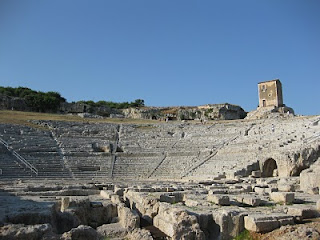



Syracuse: what a sparkling, spacious, airy Hellenic city! The Greek part of Sicily, from Selinus through Acragas and Syracuse to Tauromenium, exhibits an unadulterated historical magic that on pinions of pure feeling carries you back to that superb age of archaic finesse and cruelty which is the root of the European spirit. My visit was a baptism in lofty meditation that -temporarily- cleansed the soul of the muck of pettiness and foreboding that is its fate in the sorry place to which it has since returned.
The sun was sharp as, from the top of Archimedes' fortress, Eurylaeum, I surveyed the plain surrounding that natural wonder which is the port of Syracuse. In the play of hues and shadows in the distance it was as if that sublime confrontation, in which the sea pride of the foolish Athenians was reduced to so much floating timber, was being reenacted for my sake. Nobody else, though, saw what I saw.
When I eventually got to the port there was a big summer fire burning on the other side in the vicinity of the temple of Zeus. Nobody seemed to bother much -simply because, I think, it posed no threat to the landscape and its cultural identity. This is a fearless land, one in which through untold vicissitude and upheaval the brightness of its Hellenism has always managed to shine through. What was more impressive was how aware the locals were of these demons still inhabiting their portion of the earth and how they sought their company.
When she was informed that we came from Greece, our guide at Selinus had earlier simply said: "welcome home". This to me was like a potion of divine youthfulness running through the veins, a precious gift that I will always cherish.
Later on that day we climbed the heights of Neapolis and I spent the afternoon just gazing awestruck at the rungs of the ancient theater opening into the horizon like a giant fan of pure spirit. The white stone pulsated with religious and rational energy. It is merely the face of a cruel quarry, but no matter.
As we were getting there driving through the multiple quarries of Achradina, some gaping ominously in their underground darkness, I thought I caught a glimpse (it was probably self-suggestion) of that other theater that the wretched Athenian captives had hewn in those infernal depths, simply to while away some hours of their living death by the sweet and invincible sounds of Sophocles and Euripides.
Both the victors and the defeated, separated by absolute and pointless hatred, worshiped at the same altar. How odious is human vanity, all the more so as the vain souls are equally giants of taste and desire and capable of scaling the pinnacles of thought. The foolishness of the great deserves so much more contempt. The above-ground faces of the quarries of Achradina were scintillating in the pure sunshine reflected off the calmness of the Ionian sea.
There was one jarring note. Right across from the Paolo Orsi archaeological museum (a true gem) there stands this ugly modernistic catholic church with a pyramidal roof rising to a stupendous height and thus brutally effacing the low-voice beauty of the surroundings. This insolent cement spear can be seen from miles around, another attempt by the Christians to impress their unnatural, perverted sensibility upon a historical and physical plate that simply chokes in their violent embrace.
Medieval morbidness, either of the Western or the Eastern Christian type, has simply no place here, or anywhere else in the Hellenic universe for that matter. It makes a mockery of all that the spirit of the Hellenes strove for, namely the spirituality throbbing at the very core of physical existence and deep within the human body.
But truly there is no more egregious manifestation of this Christian violation of Hellenism than the one seen on the acropolis of Ortygia, the heart of Syracuse. There the temple of Athena, one of the three erected in Sicily to celebrated the Hellenic victory over the Carthaginians in the battle of Himera, has been usurped and defaced in order to serve as the catholic cathedral of the city.
You can see and feel the mighty Doric columns of the archaic edifice, entombed in the superimposed medieval structure, still fighting to break loose from this deadly embrace. This is a spiritual atrocity that makes one gasp (I was the only one gasping). I suppose that the original Byzantine enclosure of the ancient temple would have been insensitive enough. But what intensifies the ugliness of the rape is the addition of that execrable Baroque facade that was erected in the Bourbon 17th century. The empty pomposity of its catholic "saints" in their faux tortuousness simply makes one cringe.
It is fortunate that the temple of Apollo, a few hundred meters up the street, although itself once subjected to the same sad fate of forced Christianization, has managed to get rid of this burden, probably through earthquakes that shook off those sick prostheses. So now its two remaining columns stand proudly alone to proclaim eternally their message of freedom. Athena, however, has not yet been liberated.
The island of Ortygia is a charmed world. An attractive village of Italianate refinement that blends well with the Hellenic aura surrounding it. Its main thoroughfare opens up to the spring of Arethusa and the great port, still populated by the suffering shadows of those Athenians sacrificed in vain.
